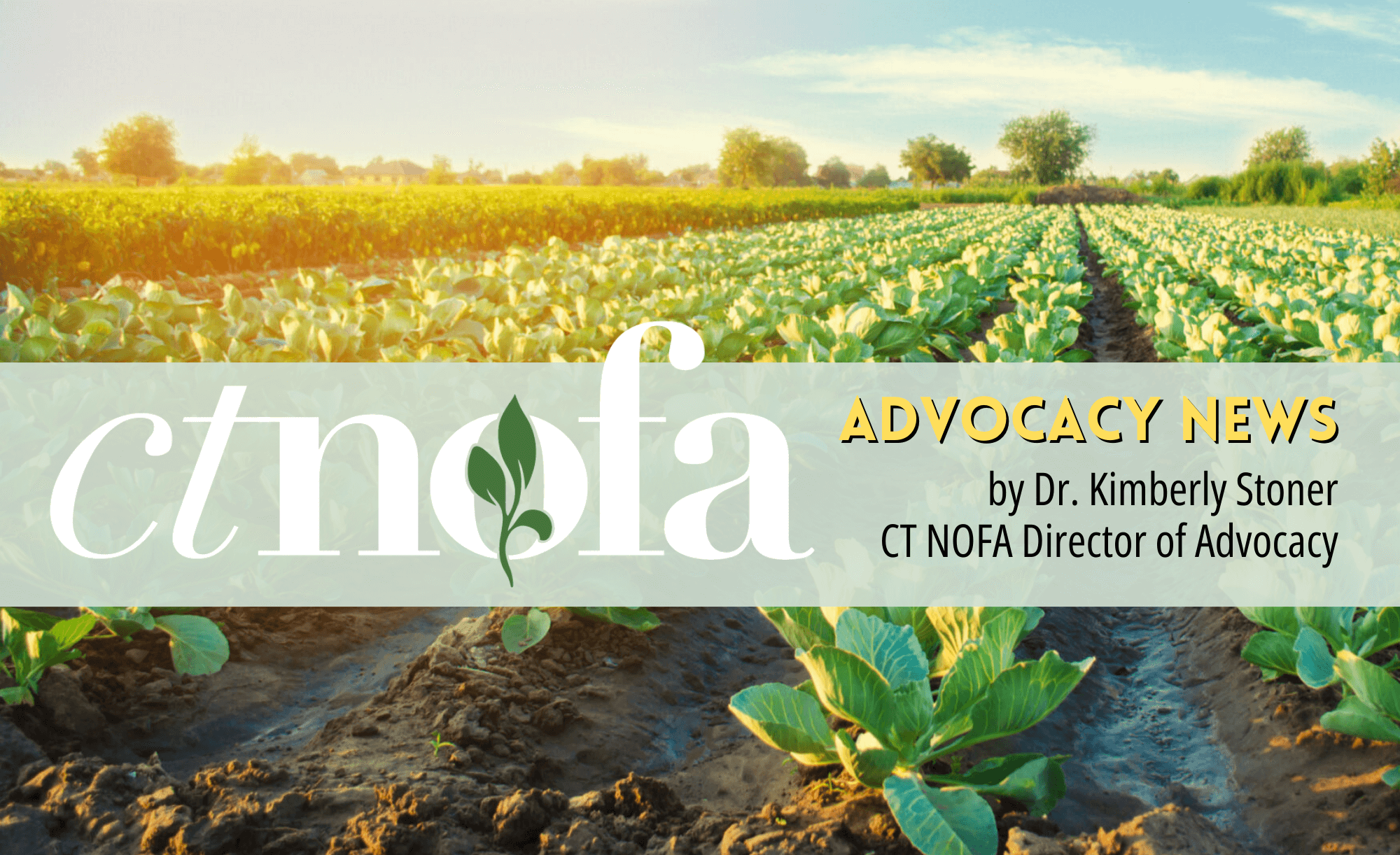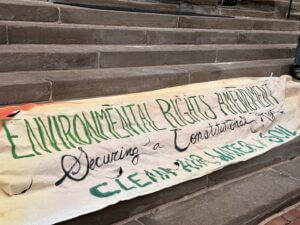Report on CT 2025 Legislative Session

June 17, 2025
The 2025 Connecticut legislative session recently wrapped up and included a number of victories on important bills supporting local food and agriculture.
Wins
All these bills are now headed to the Governor’s desk to be signed (or in some cases, have been signed already).
The “Farm Bill for Connecticut”
- Establishes a program to reimburse farmers for crop loss due to extreme weather events, like the flooding and hailstorms damaging farms last year
- Makes hoop houses and high tunnels exempt from permitting and construction standards
- Extends the ban to fertilizers as well as soil amendments with biosolids or wastewater sludge containing PFAS “forever chemicals”
- Protects agritourism businesses from civil liability for personal injury or property damage to tourists under most circumstances
- Creates a 20% farm investment tax credit for eligible farm machinery, equipment and buildings
- Increases the property tax exemption for farm machinery from $100,000 to $250,000
- Creates a grant program for best practices in manure management
- Lets farmers with the appropriate licenses use drones to apply fertilizer and pesticides — hopefully this will facilitate more precise and more limited applications.
Local Food for Local Schools Incentive Program
This existing program, which reimburses boards of education up to 50% for food purchases from local (CT) farms and up to 30% for purchases from regional (NY or New England) farms was funded at $1.5 million for the 2025-2026 year and $3.43 million of the 2026-2027 year. It was also expanded to child care providers that have meal programs.
Farmland Protection and Farmland Access
- The Don E. Williams, Jr. Community Investment Account was increased by 25% for the first time after 20 years. This account comes from a fee on land records, and is divided among agricultural programs, open space preservation, affordable housing, and historic preservation. Most of the money for agricultural programs goes to farmland preservation with smaller amounts going to the Agricultural Viability Program, the Farm Transition Program, Farm Link, and others.
- A new program was set up, to start in 2027, to offer grants to non-profit organizations, municipalities, groups of municipalities, and regional councils of governments to develop programs for farmland access and affordability. Bonding of $10 million for this program was passed, too, but whether the money actually gets bonded will depend on the Bond Commission.
Climate
- New goals for cutting greenhouse gas emissions were set: 45% below 2001 levels by 2030, 70% below 2016 levels by 2040, and net-zero by 2050. The same bill sets up a Clean Energy Economy Council and requires planning for many aspects of the energy transition. Of particular importance to CT NOFA is the requirement for CT DEEP to evaluate and advance nature-based solutions, including best practices for increasing soil health across all landscapes, increasing climate-smart agriculture and soil conservation, and restoring habitats for biodiversity.
- Another bill addressed planning for the effects of climate change that are already happening, like sea level rise, rising groundwater, extreme heat, wildfire, drought, and flooding.
Pesticides
- As part of the climate resiliency bill, second-generation rodenticides (which are so potent and long-lasting that they often poison predators and scavengers that eat rodents) have been classified as restricted use pesticides. This means that only licensed professionals can buy or use them.
- In the same bill, neonicotinoid insecticides were banned for use on lawns.
Invasive Plants
As a result of this bill, Star of Bethlehem was banned immediately; Glossy buckthorn, European buckthorn, reed canary grass, winged euonymus, European privet, black locust, miscanthus, and Japanese barberry will be banned as of October 1, 2028; and Norway maple will be banned as of October 1, 2030.
One Major Loss: A CT NOFA priority that did not pass
The CT Environmental Rights Amendment passed in committee, but with such weak language that we and our allies could not support it, and it did not move forward to a vote. We are hoping that a working group can agree on strong and effective language to move forward next year.
Recent Posts
Bulk Order NOFA Membership Discounts
The Bulk Order, in its previous format, is no longer taking place. The legacy of the Bulk Order continues – not as a one-time order event, but as an ongoing member benefit that supports growers, and grows over time as we add more vendors and wholesale-level access.
For 2026, we are connecting members to quality organic growing supplies with a direct-to-consumer purchasing option through our program partners: Progressive Grower and Fedco Seeds.
Read MoreTown Halls Across Connecticut Rally Support for Environmental Rights Amendment
Representatives Matt Blumenthal and Gregory Haddad, Senator Mae Flexer, Community Members, and Activists Call for the state legislature to pass an Environmental Rights Amendment during the 2026 Legislative Session
Read More

